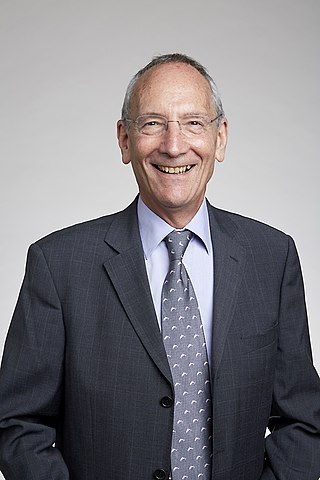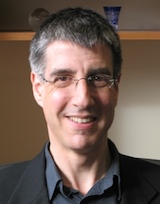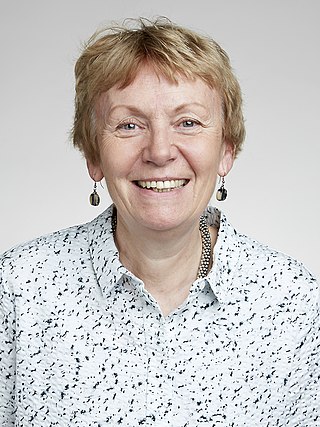Angela Vincent is a British neurosurgeon who is emeritus professor at the University of Oxford and a Fellow of Somerville College, Oxford.

The Florey Institute of Neuroscience and Mental Health, more commonly known as The Florey, is an Australian medical research institute that undertakes research into treatments for brain and mind disorders. The institute's areas of interest include Parkinson's disease, stroke, motor neurone disease, addiction, epilepsy, multiple sclerosis, Autism, Huntington's disease, depression, schizophrenia, brain function in health and disease, heart failure, and dementia.

Sir Colin Blakemore,, Hon was a British neurobiologist, specialising in vision and the development of the brain. He was Yeung Kin Man Professor of Neuroscience and senior fellow of the Hong Kong Institute for Advanced Study at City University of Hong Kong. He was a distinguished senior fellow in the Institute of Philosophy, School of Advanced Study, University of London and Emeritus Professor of Neuroscience at the University of Oxford and a past Chief Executive of the British Medical Research Council (MRC). He was best known to the public as a communicator of science but also as the target of a long-running animal rights campaign. According to The Observer, he was both "one of the most powerful scientists in the UK" and "a hate figure for the animal rights movement".

Stafford Louis Lightman is a British neurologist who has been Professor of Medicine, University of Bristol, since 1993. He was president of the British Neuroscience Association 2017–2019.
Sir John Anthony Hardy is a human geneticist and molecular biologist at the Reta Lila Weston Institute of Neurological Studies at University College London with research interests in neurological diseases.
Trevor William RobbinsCBE FRS FMedSci is a professor of cognitive neuroscience and the former Head of the Department of Psychology at the University of Cambridge. Robbins interests are in the fields of cognitive neuroscience, behavioural neuroscience and psychopharmacology.

The UCL Queen Square Institute of Neurology is an institute within the Faculty of Brain Sciences of University College London (UCL) and is located in London, United Kingdom. Together with the National Hospital for Neurology and Neurosurgery, an adjacent facility with which it cooperates closely, the institute forms a major centre for teaching, training and research in neurology and allied clinical and basic neurosciences.

Feng Depei or Te-Pei Feng was a Chinese neuroscientist and physiologist. He is considered one of founders of modern Chinese neuroscience and physiology.
Madhu Sudan Kanungo was an Indian scientist in the field of gerontology and neuroscience as well as a teacher of molecular biology and biochemistry. He is known for his theories on how gene expression changes with age and the role of this phenomenon in ageing, which is a widely accepted as "Gene expression theory of Aging". In recognition of his contributions, he was awarded India's fourth highest civilian award, Padma Shri in 2005. He held the post of BHU Emeritus professor in zoology at the Banaras Hindu University and was also the Chancellor, Nagaland University till his death.
Timothy Vivian Pelham Bliss FRS is a British neuroscientist. He is an adjunct professor at the University of Toronto, and a group leader emeritus at the Francis Crick Institute, London.
Perminder Sachdev is an Indian neuropsychiatrist based in Australia. He is a professor of neuropsychiatry at the University of New South Wales (UNSW), co-director of the UNSW Centre for Healthy Brain Aging, and clinical director of the Neuropsychiatric Institute at the Prince of Wales Hospital, Sydney. He is considered a trailblazer in the field of neuropsychiatry. Sachdev's research interests include ageing, vascular cognitive disorders such as vascular dementia, and psychiatric disorders.
Graham Leon Collingridge is a British neuroscientist and professor at the University of Toronto and at the University of Bristol. He is also a senior investigator at the Lunenfeld-Tanenbaum Research Institute, Mount Sinai Hospital in Toronto.

Stuart Graham Cull-Candy is a British neuroscientist. He holds the Gaddum Chair of Pharmacology and a personal Chair in Neuroscience at University College London. He is also a member of the Faculty of 1000 and held a Royal Society - Wolfson Research position.

Daniel Mark Wolpert FRS FMedSci is a British medical doctor, neuroscientist and engineer, who has made important contributions in computational biology. He was Professor of Engineering at the University of Cambridge from 2005, and also became the Royal Society Noreen Murray Research Professorship in Neurobiology from 2013. He is now Professor of Neurobiology at Columbia University.

Vladimir Hachinski is a Canadian clinical neuroscientist and researcher based at the Schulich School of Medicine and Dentistry at Western University. He is also a Senior Scientist at London's Robarts Research Institute. His research pertains in the greatest part to stroke and dementia, the interactions between them and their joint prevention through holistic brain health promotion. He and John W. Norris helped to establish the world's first successful stroke unit at Sunnybrook Hospital in Toronto, and, by extension, helped cement stroke units as the standard of care for stroke patients everywhere. He discovered that the control of the heart by the brain is asymmetric, the fight/flight (sympathetic) response being controlled by the right hemisphere and the rest and digest (parasympathetic) response being controlled by the left hemisphere and damage to one key component can lead to heart irregularities and sudden death. This discovery has added fundamental knowledge to how the brain controls the heart and blood pressure and lays the foundation for helping prevent sudden death.

Maria Fitzgerald is a British neuroscientist who is a professor in the Department of Neuroscience at University College London.

Dimitri Michael Kullmann is a British neurologist who is a professor of neurology at the UCL Institute of Neurology, University College London (UCL), and leads the synaptopathies initiative funded by the Wellcome Trust. Kullmann is a member of the Queen Square Institute of Neurology Department of Clinical and Experimental Epilepsy and a consultant neurologist at the National Hospital for Neurology and Neurosurgery.
Ennapadam Srinivas KrishnamoorthyFRCPS(G)-P, is a neuropsychiatrist with special interests in epilepsy and dementia. He is founder and director of Neurokrish the neuropsychiatry centre and TRIMED - chain of integrative medical specialties based in Chennai, India. He is Professor of Neuropsychiatry, Neurology and Clinical Neuroscience at The Institute of Neurological Sciences, Voluntary Health Services Multispeciality Hospital and Research Institute affiliated to The Tamil Nadu Dr. M.G.R. Medical University. He is the founder of Buddhi Clinic - a chain of integrative health centers for the brain & mind in Chennai, India.

Irene Mary Carmel Tracey is Vice-Chancellor of the University of Oxford and former Warden of Merton College, Oxford. She is also Professor of Anaesthetic Neuroscience in the Nuffield Department of Clinical Neurosciences and formerly Pro-Vice-Chancellor at the University of Oxford. She is a co-founder of the Oxford Centre for Functional Magnetic Resonance Imaging of the Brain (FMRIB), now the Wellcome Centre for Integrative Neuroimaging. Her team’s research is focused on the neuroscience of pain, specifically pain perception and analgesia as well as how anaesthetics produce altered states of consciousness. Her team uses multidisciplinary approaches including neuroimaging.

Pierre J. Magistretti is an Italian and Swiss neuroscientist and physician. He is a professor emeritus of neuroscience at EPFL, University of Geneva and University of Lausanne. Until 2012, he was the director of the EPFL's Brain Mind Institute and director of the Center for Psychiatric Neuroscience of the University of Lausanne and Lausanne University Hospital. Since 2012 he has been distinguished professor at King Abdullah University of Science and Technology where he was dean of the division of biological and environmental sciences and engineering between 2012 and 2020.












